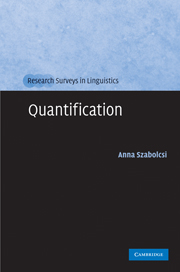Book contents
- Frontmatter
- Contents
- List of figures
- List of tables
- Acknowledgements
- 1 What this book is about and how to use it
- 2 Generalized quantifiers and their elements: operators and their scopes
- 3 Generalized quantifiers in non-nominal domains
- 4 Some empirically significant properties of quantifiers and determiners
- 5 Potential challenges for generalized quantifiers
- 6 Scope is not uniform and not a primitive
- 7 Existential scope versus distributive scope
- 8 Distributivity and scope
- 9 Bare numeral indefinites
- 10 Modified numerals
- 11 Clause-internal scopal diversity
- 12 Towards a compositional semantics of quantifier words
- Notes
- Bibliography
- Index
7 - Existential scope versus distributive scope
Published online by Cambridge University Press: 05 June 2012
- Frontmatter
- Contents
- List of figures
- List of tables
- Acknowledgements
- 1 What this book is about and how to use it
- 2 Generalized quantifiers and their elements: operators and their scopes
- 3 Generalized quantifiers in non-nominal domains
- 4 Some empirically significant properties of quantifiers and determiners
- 5 Potential challenges for generalized quantifiers
- 6 Scope is not uniform and not a primitive
- 7 Existential scope versus distributive scope
- 8 Distributivity and scope
- 9 Bare numeral indefinites
- 10 Modified numerals
- 11 Clause-internal scopal diversity
- 12 Towards a compositional semantics of quantifier words
- Notes
- Bibliography
- Index
Summary
This chapter argues that both indefinites and universals call for a distinction between existential scope and distributive scope. After motivating the distinction it focuses on existential scope; matters of distributivity are taken up in the next chapter.
Picking up the thread from §5.1 we start with the well-known case of indefinites, motivate the existential vs. distributive scope distinction, and explore the choice-functional implementation in some detail. We then go on to argue that every NP-type universals warrant the same distinction, and make several steps towards unifying their treatment with that of indefinites.
Indefinites
No such thing as “the scope” of an indefinite
The well-known claim (e.g. May 1977) that quantifier scope is clausebounded is based on examples like the following:
(1) A colleague believes that every paper of mine contains an error.
#‘for every paper of mine there is a potentially different colleague who believes that it contains an error’
As was mentioned in §5.1, Fodor and Sag (1981) noticed that the scope of singular indefinites is not clause-bounded, see (2); it even escapes islands for movement, such as a Complex DP Island, see (3):
(2) Each colleague believes that a paper of mine contains an error. ok ‘there is a paper of mine such that each colleague believes it contains an error’
Each colleague overheard the rumor that a paper of mine contains an error.
ok ‘there is a paper of mine such that each colleague overheard the rumor that it contains an error’
In fact, they proposed that if an indefinite escapes an island it takes maximal scope.
Information
- Type
- Chapter
- Information
- Quantification , pp. 91 - 108Publisher: Cambridge University PressPrint publication year: 2010
